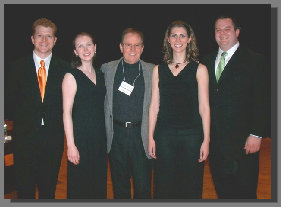Book Review: ‘Serenade: A Memoir of Music and Love,’ Feb. 24, 2014
Guest Arts Writer Paul Joseph Walkowski Weighs In Gloriously On ‘Serenade.’

‘SERENADE: A MEMOIR OF MUSIC AND LOVE
FROM VIENNA AND PRAGUE TO LOS ANGELES,
1927 TO WORLD WAR II TO 2012’
AUTHOR: CAROL JEAN DELMAR www.SerenadetheMemoir.com
WILLOW LANE PRESS, $27.99
Hardcover, 516 pages, ISBN 978-0-9860359-0-6
Also ebook
When it was decided that OperaOnline.us would drop its final curtain, editor Paul Joseph Walkowski was about to write a review of “Serenade.” I realized that the review would never come to fruition. I didn’t expect one. Then one day I received this stellar, well-written review from him. I knew that he could be a tough critic and would never write anything that he didn’t believe to be true, so I was incredibly flattered to receive this insightful review. It didn’t have a place of publication, so I have given it a home here. —Carol Jean Delmar
By Paul Joseph Walkowski
Special to Opera Theater Ink
I enjoy a good book, the type you pick up and discover, shortly after beginning, that you can’t put it down. So it is with Carol Jean Delmar’s memoir, “Serenade,” a trifecta of music and history weaved lovingly and beautifully together in delicate and sensual prose that tells a story that is fluid and compelling.
The idea for the book came about, we are told, from a series of tapes her father gave to her before his death. “After my mother died, my father spent many hours talking into a microphone and taping the story of his life as it had unfurled with my mother. He wanted me to keep the tapes, he said, so that I would truly understand my heritage.”
What unfolds for the reader is a captivating account of a common man’s indomitable spirit to succeed amidst the turmoil of a troubled time and against odds that favored failure. First, it’s a love story that embraces the lives and careers of her parents, Franz and Franziska, who met at seventeen and fifteen respectively and fell in love at first glance; second, it’s a compelling history of a time and place that evokes both fond and painful memories for those whose peaceful lives were forever changed by the horrors of the Holocaust; and, lastly, it is a first person account (Delmar’s) of what she learned on her journey through her family’s history, told briefly at the beginning of selected chapters as a literary vehicle for setting up the narrative, both historical and imaginative that follows.
In the above regard “Serenade” is a unique and original methodology of story-telling that offers multiple and layered glimpses into the times and experiences of its principal characters, stitching the author’s personal observations into the history, careers and places where her parents first met, fell in love and lived most extraordinary lives.
Mission accomplished, and much more. What started as a personal journey by the author to understand a personal history of her family evolves into a cinematic adventure that is both personal to the author and personally moving for the reader. Ms. Delmar’s eye for detail and dialogue is the stuff all good writers possess when telling a good story and seducing a reader’s attention. Delmar soars in these sections. She not only understands what a woman feels, but surprisingly captures the male psyche pretty accurately as well. This is not the garish stuff of E.L. James’s “Fifty Shades of Grey,” rather it is far more seductive and subtle. The sensuality here is found in the delicacy of the prose (yes there are love scenes) and a woman’s eye for what women seek in a relationship for it to bloom into a full blown lifelong attraction with no boundaries. “I must add that in writing this chapter, I used my imagination. I might have been too graphic in dreaming up the details,” she penned in one of her narrative introductions to a chapter. “Yet my father was not displeased. He read it and smiled.”
I suspect, this is a story that both men and women will enjoy and enjoy reading.
What I found particularly interesting about her tale is this: While the story and history are accurate, Ms. Delmar gracefully fills in what her parents thought when they first met and embraced; what they must have said and experienced when events consumed them and history unfolded in a pastiche of horror before their eyes (both were Holocaust survivors), and how they grew in their artistry, musically and professionally, through good times and bad. Indeed, I equate Ms. Delmar’s style of blending history into compelling narrative to that of another popular writer, Erik Larson in his book, “In the Garden of Beasts: Love, Terror and an American Family in Hitler’s Berlin.” If you loved the latter, you’ll truly enjoy the former, as both cover the same tragic period with equal detail, intensity and sensitivity.
On that level, this book is the deeply troubling story of a young man, Delmar’s father and his family — and their struggles living in Vienna, Austria at a time when the world and Europe was about to undergo catastrophic changes – for the worse. Young Franz wanted to be successful for both himself and Franziska, to make something of his life in the absence of a completed education, a job, a falling economy and a rise in Nazi populism, circa 1933, brought jarringly home when a friend he attended school with, a non-Jew, approached him at the conclusion of a Nazi rally and, instead of greeting him on the street as a friend, spit in his face.
The writer’s eye for detail and historic accuracy comprised of names, dates and world shattering events in their making is what lends this important book the gravitas it deserves. What is even more astounding is that Delmar tells the story of a rising young opera singer, her dad, set in the context of these and other events – and does so in an easy style, with rich detail both into the making of an operatic voice and the chaos of a time that lent anything but stability or calm to the endeavor of studying a craft as demanding as the one he chose.
Opera buffs will enjoy it because Ms. Delmar is skilled in her craft and knows the subject about which she writes, as evidenced in the surprisingly fluid and interesting paragraphs when she describes something as simple as breathing from the diaphragm and relaxing the throat muscles to allow the air and sound to flow melodically out. It’s not quite yoga, but yoga enthusiasts will understand the technique quite well.
Delmar also includes in her book numerous photographs and documents that give the reader a sense of people and place she writes about lending further authenticity to her worthwhile endeavor.
If you enjoy history, adventure, romance and plain old-fashioned story-telling you will enjoy this book. You will learn from it, tear-up over it, feel melancholy and elated in equal parts and, when you have completed reading it, you will feel immensely satisfied by the experience and journey the author invites us to partake in with her and her remarkable parents.
Paul Joseph Walkowski is a respected arts writer, critic and the author of “From Trial Court to the United States Supreme Court” and “The Will of God.” He was the editor and publisher of OperaOnline.us.

Paul Joseph Walkowski (center) at the Connecticut Opera Guild’s 52nd Annual Scholarship Competition with winners.